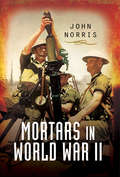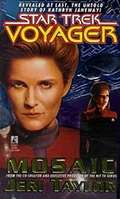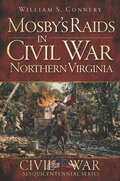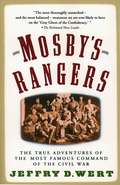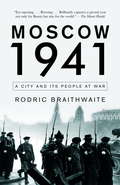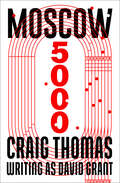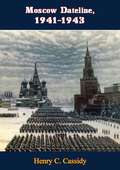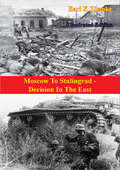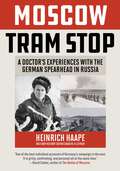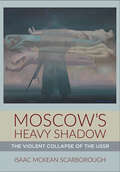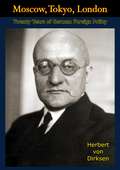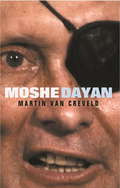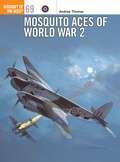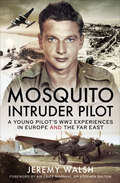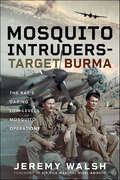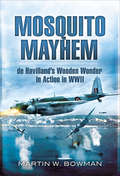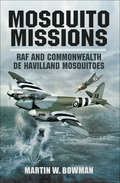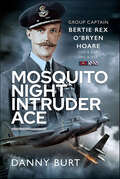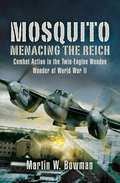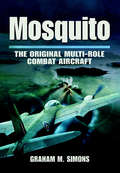- Table View
- List View
Mortars in World War II
by John NorrisMortars were used throughout the Second World War by all armies and in all theatres. Although a very simple weapon they could greatly enhance the firepower of infantry formations, giving them their own mobile artillery arm. They repeatedly proved their worth in both offensive and defensive situations, breaking up or supporting infantry attacks and laying smoke or illumination rounds. Despite their ubiquity and effectiveness, there have been relatively few works devoted to these important and versatile weapons. John Norris give a brief history of the origins of the weapon and its use in the Great War before moving on to look in detail at the many types developed and used in the Second World War. The design and development of various types and their various munitions (HE, smoke and illumination) are discussed, including those incorporated into fixed defensive systems such as the Atlantic Wall, specialist variants developed for airborne units and those mounted on vehicles to provide mobile fire support. The tactics developed for their use and the structure of the support companies formed to utilize them are also examined in detail. And of course their combat history in the many theatres is outlined, using examples drawing on first-hand accounts of those that used them. This book is sure to be of great value to enthusiasts who collect mortars and their ammunition, re-enactors, modellers and wargamers as well as those readers interested in the history of weapons generally or those of World War II in particular.
Morton Deutsch: Major Texts on Peace Psychology
by Peter T. Coleman Morton DeutschCommemorating Morton Deutsch's 95th birthday, this book presents ten major texts by this highly respected social psychologist on war and peace. This second volume presents Deutsch in his role as a leading social science activist on issues of war and peace - writing papers, making speeches and participating in demonstrations. After serving in the U. S. Air Force during World War II and being awarded two Distinguished Flying Cross medals, as a psychologist he was determined to work for a more peaceful world. Influenced by Kurt Lewin, who believed that nothing was as practical as a good theory, Deutsch pursued theoretical work on such issues as cooperation-competition, conflict resolution and social justice with regard to issues of war and peace. As President of the Society for the Study of Peace, Conflict and Violence, the Society for the Psychological Study of Social Issues and the International Society of Political Psychology, he helped to foster social science efforts to make for a more peaceful world.
Mosaic (Star Trek: Voyager)
by Jeri TaylorDiscover the fascinating life story of Captain Kathryn Janeway of Star Trek: Voyager—a compelling tale of bravery, loyalty, tragedy, and triumph.Deep in the unexplored reaches of the Delta Quadrant, a surprise attack by a fierce Kazon sect leaves Captain Janeway fighting a desperate battle on two fronts: while she duels the Kazon warship in the gaseous mists of a murky nebula, an away team led by Tuvok is trapped on the surface of a wilderness planet and stalked by superior Kazon ground forces. Forced to choose between the lives of the away team and the safety of her ship, Captain Janeway reviews the most important moments of her life, and the pivotal choices that made her the woman she is today. From her childhood to her time at Starfleet Academy, from her first love to her first command, she must once again face the challenges and conflicts that have brought her to the point where she must now risk everything to put one more piece in the mosaic that is Kathryn Janeway.
Mosby's Raids in Civil War Northern Virginia (Civil War Sesquicentennial Series)
by William S ConneryThe fascinating life of Colonel John Singleton Mosby, the Gray Ghost, before, during, and after the Civil War. The most famous Civil War name in Northern Virginia—other than General Lee—belongs to Colonel John Singleton Mosby, the Gray Ghost. His early life characterized by abuse of childhood bullies, a less-than-outstanding academic career, and even a brief incarceration, Mosby stands out among nearly one thousand generals who served in the war. Even though Mosby was opposed to secession, he joined the Confederate army as a private in Virginia, and quickly rose through the ranks. He became celebrated for his raids that captured Union general Edwin Stoughton in Fairfax and Colonel Daniel French Dulany in Rose Hill. By 1864, he was a feared partisan guerrilla in the North and a nightmare for Union troops protecting Washington City. After the war, his support for presidential candidate Ulysses S. Grant forced Mosby to leave his native Virginia for Hong Kong as U.S. consul. A mentor to young George S. Patton, Mosby&’s military legacy extended far beyond the War Between the States and into World War II. William S. Connery brings alive the many dimensions of this American hero.
Mosby's Rangers: The True Adventures of the Most Famous Command of the Civil War
by Jeffry D. WertNo single battalion was more feared during the Civil War than the 43rd Battalion of Virginia Cavalry. As one contemporary said, "They had...all the glamour of Robin Hood...all the courage and bravery of the ancient crusaders." Better known as Mosby's Rangers, they were an elite guerilla unit that operated with stunning success in northern Virginia and Maryland from 1863 to the last days of the war.<P><P> In this vivid account of the famous command of John Singleton Mosby, Jeffrey D. Wert explores the personality of this iron-will commander and brilliant tactician and gives us colorful profiles of the officers who served under him. Drawing on contemporary documents, including letters and diaries, this is the most complete and vivid account to date of the fighting unit that was so hated by General Ulysses S. Grant that he ordered any captured Ranger to be summarily executed without trial.<P>
Moscow 1812: Napoleon's Fatal March
by Adam ZamoyskiThe clash between Napoleon and Russia which led to Napoleon's downfall.
Moscow 1941: A City and Its People at War (Profile Ser.)
by Rodric BraithwaiteIn 1941 close to one million Russian soldiers died defending Moscow from German invasion–more causalities than that of the United States and Britain during all of World War II. Many of these soldiers were in fact not soldiers at all, but instead ordinary people who took up arms to defend their city. Students dropped their books for guns; released prisoners exchanged their freedom for battle; and women fought alongside men on the bloody, mud-covered frozen road to Moscow. By the time the United States entered the war the Germans were already retreating and a decisive victory had been won for the Allies. With extensive research into the lives of soldiers, politicians, writers, artists, workers, and children, Rodric Braithwaite creates a richly detailed narrative that captures this crucial moment. Moscow 1941 is a dramatic, unforgettable portrait of an often overlooked battle that changed the world.From the Trade Paperback edition.
Moscow 5000
by Craig ThomasNew York Times–Bestselling Author of Firefox: As Olympic runners prepare to compete in Moscow, a more dangerous race is happening behind the scenes . . . Amid the 1980 Moscow Olympics, a double agent is seeking to defect to the USA—and the CIA needs to take action before the KGB does. Meanwhile, Ukrainian nationalists hope to disrupt the internationally televised events with a spectacular bomb plot. Athletes from around the globe, each facing their own personal challenges, prepare for the men&’s 5000-meter race while agents in the shadows engage in a competition with far more at stake than a gold medal . . . &“A leading exponent of the genre, on a par with, though perhaps not quite as famous as, his fellow countryman Ken Follett . . . A master storyteller.&” —The Independent &“The big race itself is a knockout, wonderfully authentic.&” —Kirkus Reviews Originally published under the pseudonym David Grant
Moscow Dateline, 1941-1943
by Henry C. CassidyDuring World War II, American journalist Henry C. Cassidy observed the war in Russia at close range as Moscow correspondent of the Associated Press. Fluent in Russian and French, Cassidy served as the Associated Press bureau chief in Moscow from 1940 to 1944. During this period he became Joseph Stalin's first and most publicized pen pal.This book provides a fascinating report of his observations during years 1941-43 and constitutes one of the best books to shine a light on the Soviet Union at war behind the scenes.
Moscow To Stalingrad - Decision In The East [Illustrated Edition] (The Russian Campaign of World War Two #1)
by Earl F. ZiemkeContains 92 illustrations and 45 maps of the Russian Campaign.A brilliant modern history of the German invasion of Russia to their bloody crushing defeat by the re-invigorated Russian forces at the siege of Stalingrad.During 1942, the Axis advance reached its high tide on all fronts and began to ebb. Nowhere was this more true than on the Eastern Front in the Soviet Union. After receiving a disastrous setback on the approaches to Moscow in the winter of 1941-1942, the German armies recovered sufficiently to embark on a sweeping summer offensive that carried them to the Volga River at Stalingrad and deep into the Caucasus Mountains. The Soviet armies suffered severe defeats in the spring and summer of 1942 but recovered to stop the German advances in October and encircle and begin the destruction of the German Sixth Army at Stalingrad in November and December. This volume describes the course of events from the Soviet December 1941 counteroffensive at Moscow to the Stalingrad offensive in late 1942 with particular attention to the interval from January through October 1942, which has been regarded as a hiatus between the two major battles but which in actuality constituted the period in which the German fortunes slid into irreversible decline and the Soviet forces acquired the means and capabilities that eventually brought them victory. These were the months of decision in the East.
Moscow Tram Stop: A Doctor's Experiences with the German Spearhead in Russia
by Heinrich HaapeFirst published in 1957 and out of print for decades, Moscow Tram Stop is a classic of World War II on the Eastern Front. Heinrich Haape was a young doctor drafted into the German Wehrmacht just before the war began. He was with the spearhead of Operation Barbarossa, tasked with taking Moscow, when it invaded the Soviet Union on June 22, 1941. Mere hours into the attack, Haape and his fellow soldiers learned the hard way that the Red Army fought with otherworldly tenacity even in defeat. The rapid advance of the early days slowed during the summer, and Haape&’s division did not begin the final push on Moscow until October. It was a hard slog, plagued first by rain and mud, then by cold and snow. By early December, German forces had reached the gates of the Soviet capital but could press no farther. By winter&’s end, Haape&’s battalion of 800 had been reduced to a mere 28 soldiers. The doctor&’s account is enthrallingly vivid. The drama and excitement never slacken as Haape recounts his experiences from the unique perspective of a doctor, who often had to join in the fighting himself and witnessed the physical and psychological toll of combat.
Moscow's Heavy Shadow: The Violent Collapse of the USSR
by Isaac McKean ScarboroughMoscow's Heavy Shadow tells the story of the collapse of the USSR from the perspective of the many millions of Soviet citizens who experienced it as a period of abjection and violence. Mikhail Gorbachev and the leaders of the USSR saw the years of reform preceding the collapse as opportunities for rebuilding (perestroika), rejuvenation, and openness (glasnost). For those in provincial cities across the Soviet Union, however, these reforms led to rapid change, economic collapse, and violence.Focusing on Dushanbe, Tajikistan, Isaac McKean Scarborough describes how this city experienced skyrocketing unemployment, a depleted budget, and streets filled with angry young men unable to support their families. Tajikistan was left without financial or military resources, unable and unprepared to stand against the wave of populist politicians of all stripes who took advantage of the economic collapse and social discontent to try to gain power. By May 1992, political conflict became violent and bloody and engulfed the whole of Tajikistan in war. Moscow's Heavy Shadow tells the story of how this war came to be, and how it was grounded in the reform and collapse of the Soviet economy that came before.
Moscow, Tokyo, London: Twenty Years Of German Foreign Policy. [1st American Ed. ].
by Herbert Von DirksenFirst published in English in 1951, these are the fascinating memoirs of a high level German diplomat, detailing his many years of work within German Embassies at Moscow, Tokyo, London, and elsewhere. The book provides extensive information on the formulation of foreign policy, international negotiations and treaties during the Nazi era, as well as the interwar period.“The aim of this book is to give an account of a political career spent almost exclusively in Eastern European and Far Eastern countries. The task assigned to me by Hitler in London was that of a letter-carrier. My efforts to break the shackles imposed on me and to oppose a policy which was bound to lead to the catastrophe of the Second World War proved futile.”—Herbert von Dirksen
Moshe Dayan (GREAT COMMANDERS)
by Prof Martin van CreveldMartin van Creveld's Moshe Dayan tells the story of one man and of one people, to whom he was a figurehead - a symbol of their patriotism and their determination to survive. Born in a kibbutz in 1915, Dayan joined the Hagana when he was just fourteen, thus starting early a military career that saw him serve in every war fought in the Middle East from the War of Israeli Independence in 1948 to the Yom Kippur War of 1973. Twice he led his country's forces into smashing victories. Having planned and executed the one and directed the other, with his one eye he towers over them like Nelson over the Battle of Trafalgar.Skilled in battle, skilled in diplomacy, like many powerful public figures, Moshe Dayan's private life was far from mundane. The book quotes from little-known sources, including an account written by one of his mistresses, that reveal much about his character and his life away from the battlefield. This is an honest portrayal of both the private and the public figure, which seeks to understand a man whose contribution to the state of Israel in its developing years was immeasurable.
Moshe Dayan (Great Commanders Ser.)
by Martin Van CreveldMartin van Creveld's Moshe Dayan tells the story of one man and of one people, to whom he was a figurehead - a symbol of their patriotism and their determination to survive. Born in a kibbutz in 1915, Dayan joined the Hagana when he was just fourteen, thus starting early a military career that saw him serve in every war fought in the Middle East from the War of Israeli Independence in 1948 to the Yom Kippur War of 1973. Twice he led his country's forces into smashing victories. Having planned and executed the one and directed the other, with his one eye he towers over them like Nelson over the Battle of Trafalgar. Skilled in battle, skilled in diplomacy, like many powerful public figures, Moshe Dayan's private life was far from mundane. The book quotes from little-known sources, including an account written by one of his mistresses, that reveal much about his character and his life away from the battlefield. This is an honest portrayal of both the private and the public figure, which seeks to understand a man whose contribution to the state of Israel in its developing years was immeasurable.
Moshe Dayan: The Making of a Strategist (Cambridge Military Histories)
by Eitan ShamirIn this major re-evaluation of Moshe Dayan's life and career, Eitan Shamir examines one of the most influential individuals in the history of modern Israel. As IDF Chief of Staff, theatre commander during the Sinai campaign and defence minister during the Six Days and Yom Kippur Wars, Dayan shaped Israeli history as well as the principles of Israel's security and foreign affairs. Eitan Shamir explores the basis and justification for Dayan's reputation as a strategist and what made his command and leadership unique. He reveals the ways in which Moshe Dayan led and planned his campaigns, how he made his decisions and his style as a general and a strategist. His findings shed important new light on broader issues of military command and culture, political-military relations, insurgency and counterinsurgency and the relations between small states and large powers, drawing lasting lessons for strategy today.
Mosquito Aces of World War 2
by Chris Davey Andrew ThomasThe Mosquito developed into one of the most versatile aircraft of World War 2, entering service with Fighter Command in early 1942. The 'Mossie' was soon defending raids on Britain's Cathedral cities and became an integral part of the country's night defences. Its airborne radar gave it the ability to 'see' the enemy at night, and its speed and devastating fire power made it the finest nightfighter deployed by any side during World War 2. This book examines the infamous Mosquito, the nightfighter that was used by many leading RAF, Commonwealth and American aces.
Mosquito Bomber/Fighter-Bomber Units 1942-45
by Chris Davey Martin BowmanTruly an example of engineering ingenuity born out of the desperation of war, the legendary 'all-wooden' Mosquito was perhaps the best twin-engined fighter-bomber of its size to see action in World War II (1939-1945). The first bomber variant to enter service was the B Mk IV, initial examples of which were issued to No 2 Group's No 105 Sqn at Swanton Morley, in Norfolk, in November 1941. Considerably faster than the unit's previous Blenheim Mk IVs, powered by inline rather than radial engines, and made of wood instead of metal alloy, the Mosquito initially proved a challenging mount for both air and groundcrew alike.
Mosquito Intruder Pilot: A Young Pilot’s WW2 Experiences in Europe and the Far East
by Jeremy WalshBen Walsh lied about his age to join the RAF, determined to play his part in the Second World War. He volunteered to be an intruder pilot, flying low level operations in the dark. Initially flying ops in Douglas Boston Intruder IIs, he then converted to the legendary de Havilland Mosquito FB VI. Ben flew ops for three years, starting in the skies over with Europe with 418 (RCAF) Squadron, then ferrying one of the first Mosquito FB VIs to India before flying in the Burma campaign with 27 Squadron (under Wing Commander Nicolson VC) and finally with 45 Squadron. The Mosquito developed problems in the severe climate it encountered in the Far East which resulted in the aircraft being temporarily grounded in November 1944. This saw Ben undertaking thirteen operational sorties in venerable Tiger Moths in the Arakan. Although Ben survived belly landings, crashes, enemy fire and engine failures, the strain of combat operations took its toll on the still-young pilot. He and his navigator asked to be removed from operations, but their request was denied, both being threatened with court martial. By the end of the war when still only 21 years old, Ben was suffering from a nervous condition known as ‘the twitch’. His confidence and health were restored by the young woman who had been his pen friend through the war, who became his wife and the mother of the man who has compiled this dramatic and moving story – Jeremy Walsh. Throughout the war, Ben maintained a ‘Roll of honor’ in his photograph album, memorializing his friends and colleagues who lost their lives. That album forms the backdrop to this important biography, which is based on Ben’s own recollections, his logbook and the notes he kept through the war. Mosquito Intruder Pilot is Ben’s story.
Mosquito Intruders—Target Burma: The RAF’s Daring Low-Level Mosquito Operations
by Jeremy WalshUses diaries, first-hand accounts, and official records to take the reader through the Mosquito intruders’ three-year campaign to help force the Japanese out of Burma, living and dying with the brave warriors in the five squadrons which flew the FB VI. The exploits of the Mosquito crews in Burma, skimming at low-level and at speed along rivers and over treetops to their targets, are the stuff of legend. Surprisingly, however, only five RAF squadrons ever flew these operations. Mosquito Intruders – Target Burma explores the achievements of these intruder squadrons, as well as the costs to the men who flew and supported them. Their story starts in mid-1943, almost as soon as the fighter-bomber variant of the ‘Mossie’, the iconic de Havilland Mosquito FB VI, had been introduced to squadron service in the UK. The first challenge was to deliver the new aircraft, with its radical wooden construction, to India and build a supply chain to support it. Then, with few dual-control aircraft, they needed to train the crews to operate the Mosquito to the limits of its performance in often hostile weather over inhospitable territory against an aggressive enemy. Some crews converted from a similar low-level role to extend the reach of the impressive but already obsolescent Beaufighter. Other squadrons, converting from the single-engine Vultee Vengeance dive bomber, needed to learn how to handle a faster twin-engine intruder and to fly at low level. Against the odds, both the aircraft and their crews delivered! Mosquito Intruders – Target Burma uses diaries, first-hand accounts, and official records to take the reader through the Mosquito intruders’ three-year campaign to help force the Japanese out of Burma, living and dying with the brave warriors in the five squadrons which flew the FB VI. The first operations were flown by 27 Squadron, led by the renowned Wing Commander James Nicolson VC, the only person in RAF Fighter Command to be awarded the Victoria Cross during the Second World War. Many of the airmen, like the author’s father who flew Mossie intruder ops with both 27 and 45 Squadrons, felt that they were ‘forgotten’ by the public back home and often by their own high command. But importantly, they knew that their actions were shortening the war in the Far East.
Mosquito Mayhem: de Havillands Wooden Wonder in Action in WWII
by Martin W. BowmanThe flak started about four or five minutes before the target and immediately it was apparent that it was intense and extremely accurate. Oboe entailed the pilot flying dead straight and level for ten minutes on the attack run. Suddenly a tremendous flash lit up the sky about 50 yards ahead of our nose and exactly at our altitude. Within a tenth of a second we were through the cloud of dirty yellowish-brown smoke and into the blackness beyond. I shall never forget the spontaneous reaction of both my pilot and myself. We turned our heads slowly and looked long and deep into one anothers eyes - no word was spoken - no words were needed.The Mosquito was probably World War IIs most versatile combat aircraft. This book contains hundreds of firsthand accounts from many of the twoman crews who flew in them; pilots and navigators. It portrays the dramatic experiences of flying in its many roles as pathfinder, night fighter, reconnaissance aircraft, precision bombing and low-level ground attack aircraft. It describes many of the RAFs most audacious raids on prime but difficult targets where carpet bombing by heavy bombers was likely to be ineffective and cause unnecessary casualties to civilians. It is a remarkable record of the aircraft and the men that flew them.
Mosquito Missions: RAF and Commonwealth de Havilland Mosquitoes
by Martin W. BowmanThe Wooden Wonder was probably the most versatile combat aircraft that operated on all fronts in World War Two and was still giving valuable service in first-line service after 1945 when it enjoyed a limited renaissance both at home, in Germany and abroad until the advent of jet aircraft. Martin Bowmans well-tried and respected formula of incorporating background information with scores of RAF, Dominion, and overseas pilots and navigators personal narratives, is employed here once again to great effect. Previously unpublished tales take the reader raid by raid on night-fighter, fighter-bomber, anti-shipping, path finder, photo-reconnaissance and precision bombing operations in the Middle East and jungles of the Far East, where the Mosquito carried out a series of thrilling post-war functions.The book includes a series of evocative black and white images of the Mosquito in action, which supplement the text perfectly and work to illustrate the might of this iconic craft.
Mosquito Night Intruder Ace: Wing Commander Bertie Rex O’Bryen Hoare DFC & Bar, DSO & Bar
by Danny BurtBertie Rex O’Bryen Hoare was born on 6 June 1912. Having been educated at Harrow and Wye Agricultural College, ‘Sammy’, as he was often known to friends and family, entered the RAF on a short-service commission in 1936. In October 1938, while piloting a Fairy Battle Bertie sustained a serious injury from a piece of loose piece of aircraft cowling. This incident resulted in him being totally blinded in one eye. Though he was initially grounded, his determination to return to the air never diminished. The outbreak of war in September 1939, saw his wish be granted when Bertie was given permission to return to operational flying duties. Bertie was posted to 23 Squadron, which was flying Blenheims at the time. The squadron then converted to Havocs, the crews being tasked with undertaking out nighttime operations over Occupied Europe. Despite his restricted night vision and depth perception, Bertie went on to became one of the RAF’s leading advocates in the art of what was known as ‘intruder operations’. In the months and years that followed, Bertie served in, and then commanded, a number of RAF squadrons. By the time the war in Europe came to an end, he was the Station Commander at RAF Little Snoring in Norfolk – which, at the time, was home to de Havilland Mosquitos undertaking intruder operations. Bertie opted to remain in the RAF after the war, this time being posted to 84 Squadron. However, his luck finally ran out on 26 March 1947, when the Mosquito he was ferrying to Australia crashed off its northern coast. Reported missing at the time, Danny Burt reveals the full circumstances of this tragic incident. This is the biography of one of the RAF’s greatest characters of the Second World War. With his ‘epic’ over-sized mustache, Bertie Hoare was a pilot who, with the end of the fighting, had risen to the rank of Group Captain, been awarded the Distinguished Service Order and Bar, the Distinguished Flying Cross and Bar, and been Mentioned in Despatches. Bertie ended the war having flown over 100 combat sorties.
Mosquito: Combat Action in the Twin-engine Wooden Wonder of World War II
by Martin W. BowmanOn 15 November it came suddenly out of nowhere inches above the hangars with a crackling thunderclap of twin Merlins. As we watched, bewitched, it was flung about the sky in a beyond belief display for a bomber that could out perform any fighter. Well-bred whisper of a touch down, a door opened and down the ladder came suede shoes, yellow socks and the rest of Geoffrey de Havilland.The memories of Sergeant (later Flight Lieutenant DFC) Mike Carreck who was an observer with 105 Squadron when he first laid eyes on the new de Havilland Mosquito. This was an aircraft that would prove itself to be one of the most versatile and revered aircraft to fly with the RAF in World War II.This book is full of firsthand accounts from the crews that flew the Mossie in its roles as a bomber, long-range reconnaissance and low-level strike aircraft. The author has gathered together many of the most exciting operational reports that cover the period from the types introduction until the end of World War II. The text is interwoven with the background history of the personnel and squadrons, the purpose of the operations undertaken and their often devastating results.
Mosquito: The Original Multi-Role Combat Aircraft
by Graham M. SimonsDuring the history of aviation there have been very few aircraft that have achieved immediate success when entering front-line service. The de Havilland Mosquito was one such aircraft. It was not designed to an RAF requirement, but was the result of an initiative of the designers and builders to utilize the skills of woodworkers and the relative abundance of wood in the crisis years of World War II. The result was an airplane that could be built quickly, was extremely fast and extremely versatile. The pilots loved it.This book describes how it was built and utilizes many hitherto unpublished photographs from the design studio and production lines. It illustrates and explains the many different roles that the aircraft took as the war progressed. Fighter, bomber, reconnaissance, night fighter there were few tasks that this brilliant design could not adopt.
